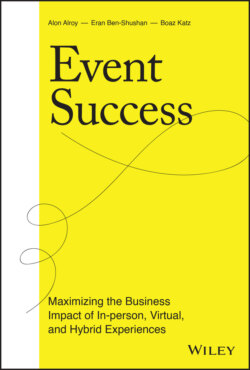Читать книгу Event Success - Alon Alroy - Страница 7
CHAPTER 1 How We Got Here
ОглавлениеLive events shape history.
Pick any moment in time—the Industrial Revolution, the Enlightenment, the Roman Forum, the biblical era—and you'll find a congregation of people and the sharing of ideas to be the definitive force of progress and innovation of the age.
Gathering to debate and share ideas is such a natural human tendency that it was rare to find people who questioned the value of this practice. Some might prefer certain events over others, some might attend out of necessity rather than interest, but the value of attending events—of being at the center of those ideas and debates and decisions—was rarely called into question. At least until very recently.
Back in 2019, we published a collection of quotes from conversations with event leaders. These quotes were pulled from our IN-PERSON podcast series, where we feature the world's most daring events and the people who make them happen. The book ranged from topics like experiences to community to team leadership, but one of the first topics we covered was the most inspiring: “Why events?”1 The answers, as you might expect, ran the gamut but shared a common theme. Here are a few of the quoted answers:
Chardia Christophe-Garcia, then a marketing director at Forbes: “More and more we're seeing that the event landscape isn't going anywhere. People want experiences. They want to have that one-to-one connection and networking.”
Lindsay Niemic McKenna, then vice president of revenue marketing at Yext: “People understand that human connection is really important, especially as we're becoming a more digitized world.”
Hugh Forrest, chief programming officer at SXSW: As much as we've changed and improved technology to be able to connect with people, nothing yet replaces real-time, face-to-face interactions in terms of creating new opportunities.”
Colleen Bisconti, vice president of global conferences and events at IBM: “We're seeing that the events are still the primary driver of marketing results. Events touch almost every single opportunity that progresses and ultimately closes. So it's a great place to be, and it's a great way to lean in and to provide business results. And that's why I love it so much.”
An event, at its core, is about community building: gathering people around a shared idea, vision, goal, market vertical, or story. In the modern context, and specifically in relation to corporate events, it's an opportunity to share the brand's story, to turn a slogan or a product or an idea into a tangible experience. It's an opportunity for businesses, nonprofits, and for-profit event organizers to show the world who they are and what they stand for during an intense (but limited) time frame. It's the one big chance many get each year to deliver an important message to a captive audience. It's an opportunity to celebrate and showcase a brand's achievements.
Events are also a key opportunity to grow business. In marketing terms, events offer value at virtually every stage of the sales funnel, from awareness to conversion and everything in between. They are a venue for finding new business, upselling old business, or simply strengthening relationships with customers and partners in hopes of improving future business. If you want to drive sales, history has proven that events are a great way to do so.
Finally, events are key to strengthening internal relationships. Just as they can facilitate commerce, they can also facilitate camaraderie. Business is based on relationships, and throughout history humanity has relied on shared experiences to establish or strengthen those bonds. Events are where those “hallway moments” happen—when relationships built on financial incentives, convenience, or coincidence evolve into something more concrete.
In short, events just kind of work, and always have. As long as they evolve.
